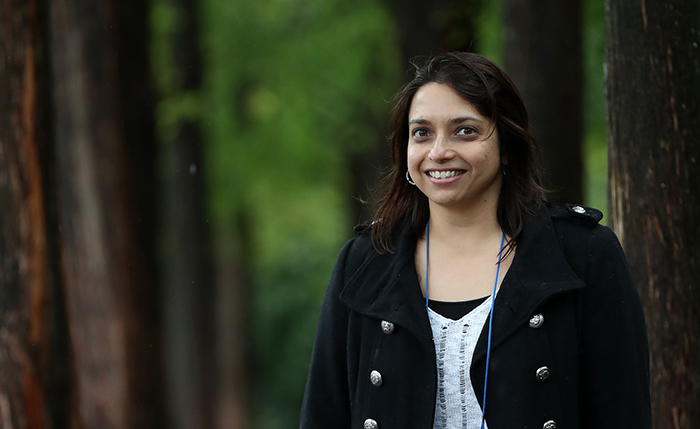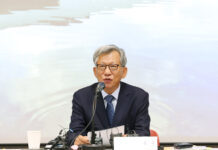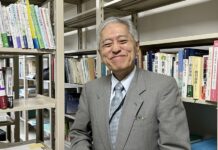
Since 2014, Diya Mitra of the U.K. has been a Korea.net Honorary Reporter. (Korea.net DB)
By Yoon Sojung
The induction ceremony for the eighth group of Korea.net Honorary Reporters on May 20 in Seoul saw a combined 591 applicants from 73 countries.
The ceremony this year had added meaning since May 20 was Together Day, a commemorative occasion in Korea designated in the hope of getting Koreans and people overseas to coexist in harmony.
Since 2014, Diya Mitra of the U.K. has served as a Korea.net Honorary Reporter. Witnessing the development of the program during its not-so-long history, she was even selected as a leading Honorary Reporter receiving an invitation to Korea in October 2016. Along with other honorees, she traveled to Seoul, Busan and Tongyeong to explore Korea and gather material for her articles.
Mitra writes articles and draws cartoons on various themes such as Korean food and literature. Her cartoons reflect her personal experiences with things Korean such as dealing with kimchi’s strong smell, receiving favorable responses from readers.
Korean literature is something she feels particularly passionate about. She is a moderator of a Korean literature book club at the Korean Cultural Centre in London. The BBC in May 2016 took notice of her when Korean novelist Han Kang received the Man Booker International Prize for “The Vegetarian”; the news article displayed a photo of Mitra wearing her Korea.net Honorary Reporter jacket while standing next to the author.
Calling her fellow Honorary Reporters “family,” Mitra advised newbies to “find your niche, find the things you feel passionate about and really focus on that.”
The following are excerpts from a Korea.net interview with Mitra.
– Why did you become a Korea.net Honorary Reporter?
I got interested in Korea when I met my friend, who’s now my best friend. I suppose I’m fascinated by the (Korean) concepts of han, or a feeling of deep sorrow, and jeong, or human affection. I also know that the meanings of both terms are challenging to translate into English. I love Korean culture, and first came to Korea in 2007 and loved Korean food, culture and everything. I wanted to share my experiences in Korea with all, so I decided to apply for the position of Korea.net Honorary Reporter.
– What moment made you feel proud or happy as a Korea.net Honorary Reporter?
The most challenging thing (about being an Honorary Reporter) is when I don’t have enough time, though I have a lot of ideas and projects to cover in London, because I have a full-time job. One of the most amazing times I had as an Honorary Reporter was being invited to Korea in 2016. I traveled to Seoul, Busan and Tongyeong with other 11 Honorary Reporters selected from around the globe whom I’d never met before; I talked a lot with them about Korea. It was an amazing trip. At the end of the trip, we became a family and still keep in touch.
– You have a strong interest in Korean literature. What are your favorite Korean literary works?
It’s difficult to choose a favorite book. I can think of my top three for now: “I’ll Be Right There” by Shin Kyoung Sook translated by Sora Kim-Russell, “A Greater Music” by Bae Suah translated by Deborah Smith and “No One Writes Back” by Jang Eunjin translated by Jung Yewon. I believe the best way to know about a culture and a country is to read books, and what better way than to read literature of the country.
– What are you planning to do as an Honorary Reporter?
I hope to focus more on my interest in Korean literature and present stories from my experiences in cartoon form, such as attending my best friend’s wedding and traveling around Korea. I also look forward to collaborating with Bardise Eldeeb, another Korea.net Honorary Reporter who draws cartoons. And I hope to work more on videos, share my experiences in London and look forward to meeting the newest Korea.net Honorary Reporters.
arete@korea.kr























